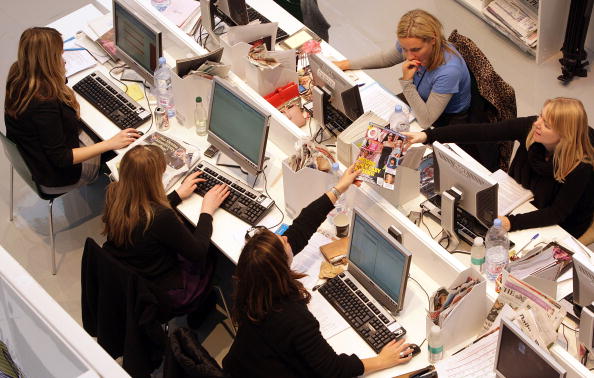Men must be included in the discussion of gender equality in the workplace, otherwise women will continue to suffer
'If the men stand above the glass ceiling while we push against it, the task of breaking through will be made considerably harder'

During my three years at university, I have been heavily involved with my student media group, determined eventually for it to lead into a career in journalism. The newspaper has probably played the biggest part in shaping my higher education experience. Unfortunately, though, it has also been the biggest eye-opener to the difficulties I will face as a woman entering into this field.
This year, and like every year before, The Mancunion received a disproportionate amount of male applications for editorial positions, and only 26 per cent of the opinion articles this year have been written by women. Something is clearly preventing women from putting themselves forward in this environment and, for many, it appears to be a confidence issue.
This is why the Women in Media conference was born, its aim to empower confidence in female students wishing to succeed - as well as their male counterparts - in the world of media. Very few seem to believe they have the power to achieve this yet, until they do, the male-dominated picture presented within the industry will continue to act as a deterrent to women who desperately need role models to look up to.
The faces of our national media are disproportionately male faces and, if nothing is done, it will be allowed to continue along the same path. The damaging representation of women, an issue which plagues us still today - when the Daily Mail can call “obesity in women as dangerous as a terror threat” - is not surprising, if women make up just a third of full-time journalists across the country. While women remain out of newsrooms and editorial boards, the news printed and presented about them will continue to misrepresent our gender.
Yet, women have never been better supported, with campaigns being set up across the country to support them, including the recently launched Women in Journalism mentoring scheme, devised by Cristina Nicolotti Squires, editor of Channel 5 News. It aims to “help women at the start of the careers, women returning to work after a break, or just those who want to make the step up to more senior roles.” This type of support reflects the principle which has guided our efforts in Manchester whilst organising this conference that “one woman’s success makes every woman stronger.”
A study was recently conducted by City University professor, Suzanne Franks, which found that, while women outnumber men on journalism trainee courses and at entry-level, men are still much more likely to reach the senior positions. There are clearly a great number of female students pursuing a career in journalism. Yet, as women, we have many more obstacles to overcome in order to reach the heights of journalism we are aiming for and, for some, the presence of these obstacles leads to a lack of confidence in the heights ever being reached.
There has never been a more opportune time to set up a campaign supporting the confidence and careers of women. However, many of the present schemes are working with women already within established careers, some already suffering from discrimination due to their gender, or a suffering from a lack of confidence in their abilities to succeed in a male-dominated field. Unless we attack these issues from the very beginning of a woman’s career, within student media groups, we allow the minds which will shape the future of UK media to be tainted by the inequality which many within the media are presently working tirelessly to rectify. Their efforts will be in vain if the future journalists, TV and radio presenters, bloggers and photographers all learn about the career within an environment dominated by men.
That’s why the Women in Media conference is crucially inclusive to all genders, with both men and women invited to come and hear the speeches made by the inspirational women from all areas of the industry. Unless men are included within our discussions, and know of the issues we face, we will continue to face them.
The task of breaking the glass ceiling has to be a task undertaken together. If the men stand above the ceiling while we push against it, the task of breaking through will be made considerably harder.
More information about the Women in Media conference and tickets can be found here
Subscribe to Independent Premium to bookmark this article
Want to bookmark your favourite articles and stories to read or reference later? Start your Independent Premium subscription today.

Join our commenting forum
Join thought-provoking conversations, follow other Independent readers and see their replies